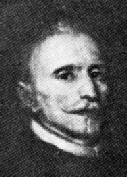|
 Born November 25th, 1562, about two years before
Marlowe
and Shakespeare,
Lope Félix de Vega Carpio would outlive them both. The first Spanish
dramatist to make a living as a playwright--and now considered the
greatest of all Spanish playwrights--Lope is said to have written
over 2,200 plays, over 500 of which have survived! Born November 25th, 1562, about two years before
Marlowe
and Shakespeare,
Lope Félix de Vega Carpio would outlive them both. The first Spanish
dramatist to make a living as a playwright--and now considered the
greatest of all Spanish playwrights--Lope is said to have written
over 2,200 plays, over 500 of which have survived!
Today, Lope would be considered a prodigy. At the age of five, he
could read Latin, as well as Spanish, and had begun composing
poetry. At fourteen, he was a student at the Imperial College at
Madrid, but ran off with a classmate and joined a military
expedition against Portugal. Fortunately, the Bishop of Avila came
upon Lope and, sensing the young boy's talent, took him under his
wing. Under the Influence of the Bishop, Lope enrolled at the
University of Alcalá and graduated with a bachelor's degree. He was
on the verge of following in the the Bishop's footsteps and becoming
a priest when, suddenly, he fell violently in love, revealing a
passion that would later manifest itself in his plays.
After graduating from Alcalá, Lope joined a naval expedition to
the Azores, then went to Madrid where he began his assault on the
Theatre. He quickly fell in love with a married woman, the daughter
of the producer who bought his plays. The affair lasted for five
years, and Lope celebrated his love under the name of Filis in many
of his ballads, but when it ended, it ended violently. Lope fell
into a furious quarrel with the woman's father and began to refuse
him his plays. He also lampooned the man mercilessly which resulted
in a libel suit. Lope was first imprisoned, then exiled from the
kingdom of Castile for two years. Within three months, Lope returned
to Madrid at the risk of being sent to the galleys and eloped with
Isabel de Urbina, the daughter of a prominent courtier, only to
later abandon her. In 1588, he left Isabel in Madrid and joined the
Spanish Armada.
Fortunately for the good of the Spanish Theatre, Lope escaped the
fate of many of his fellow soldiers during this disastrous venture
against Britain. His ship, the San Juan, was one of the few
to return safely. Not only did Lope survive, but he spent the six
month voyage composing the epic poem The Beauty of
Angelica.
After returning to Valencia, Lope set about the business of
making a living in the theatre. Soon, he was composing so many plays
that more than one manager was dependant upon the young playwright
for his supply. But Lope still found time to carry on his love
affairs. He soon initiated a tryst with the actress Micaela de Luxon
who would provide him with four children and inspire many a sonnet.
He would remain as constant to her as was possible for a man of his
ilk, which meant that she would share him with several other Spanish
ladies. In 1598, he married the daughter of a successful pork
merchant.
Lope's affairs produced a large number of offspring. In 1605, he
found himself the father of both a son by his wife and a daughter by
Micaela. Two years later, Micaela also gave birth to a son named
Lopito who would become a talented poet. In spite of his many
affairs, Lope was a devoted father. When his wife died in 1613, he
brought all of his children together under one roof.
In 1614, Lope became a priest. However, he continued to write
secular plays, and he continued to carry on his affairs--most
notably with the wild actress Lucia de Salcedo and a young married
woman named Doña Marta. However, he seems to have been devoted in
his own way to the priesthood, for he was known to have been in the
habit of scourging himself for "the good of his soul" until the
walls of his room were flecked with blood!
In 1632, Lope lost Doña Marta. Three years later, his son Lopito
was lost at sea, and his illegitimate daughter eloped with a
courtier. These losses weighed heavily on the seventy-three-year-old
playwright. Lope de Vega died on August 27, 1635.
Most of Lope's plays revolve around the conflicting claims of
love and honor. His most popular work is Fuente Ovejuna or
The Sheep Well (1614) in which a tyrannous feudal lord is
murdered by villagers who refuse to confess and are eventually
spared by intervention of the king. Other popular plays by Lope de
Vega include The Foolish Lady (1613), Finding Truth
Through Doubt (1620-24), The Knight from Olmeda (1622)
and Punishment without Revenge (1631).
|

